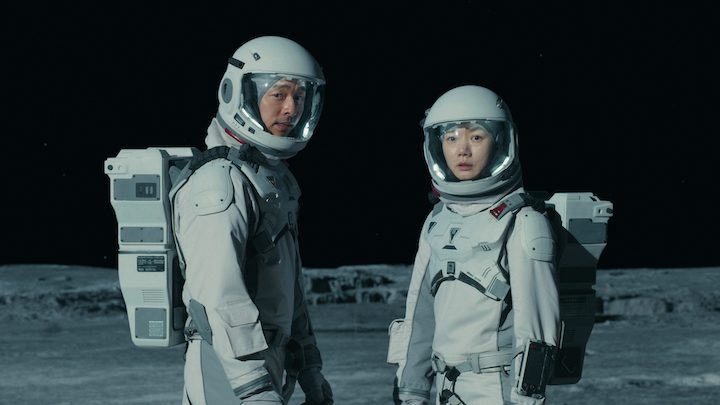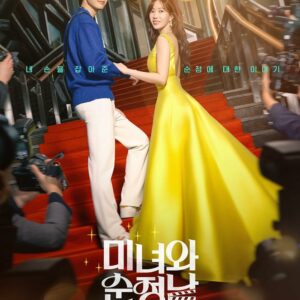
There was a time when a post on Korean science fiction would be a very short one, comprising as it would an essay on the 2017 drama, Circle and little else.
As far as genres go, science fiction is stylistically very different to the classic Korean drama. Even those times where writers decided to include elements that could be considered part of the science fiction canon (such as time travel) they were utilised as fantasy rather than science. Popular time travel shows like Signal or Tunnel, Queen In-hyun’s Man or Live Up to Your Name are either outright fantasy or a different genre (such as crime) with a supernatural twist.
Not that Korea is alone in its lack of science fiction television. Internationally, there has been a significant decline in science-based narratives produced over the last decade. With the notable exception of the wonderful The Expanse, investment in science fiction as a genre is down everywhere (and The Expanse had a legendarily difficult time maintaining support from a network to keep itself going). Of course, speculative fiction is thriving in the young adult space but these tend to be made into big budget films rather than television shows.
At the same time, fantasy has grown in popularity and there has been an explosive increase in hybrid dramas: those that merge the speculative fiction elements of science fiction with fantasy. The growth of both the zombie craze and the superhero craze has seen the green lighting of a plethora of fantasy shows with science-lite explanations underpinning them. Korea has been an enthusiastic participant in this trend, producing popular shows like Happiness and Kingdom, as well as movies such as Train to Busan and Alive.

But there is a difference between a move away from science fiction and a narrative tradition that classically never had science fiction at all. While an international runaway success, Squid Game demonstrated the reason why Korean television writers struggle with the genre. Korean dramas have generally been reflective character pieces that are almost entirely character driven. In contrast, science fiction is plot driven to the point where flat and simplistic characterisation is often its greatest flaw. The tension between these two traditions is noticeable in Squid Game, where they often clash.
It does hold out the possibility though – if Korea could combine its exceptional character writing with a tight and interesting plot then it could potentially create some of the best science fiction television there is; speculative fiction with strong three-dimensional characters and some genuine heart.
Over the last year or so, Korean television writers have been dipping their toes into the genre and seeing what they can come up with.
Why? or Why now? is the matter of some debate. Some commentators believe that the demands of international audiences are changing the type of content that Korea is producing. A more likely explanation is that the advent of streaming platforms such as Netflix, Disney+ and Prime Video has given Korean writers new distribution channels that allow them to experiment without the tight restrictions set down by domestic channels. So it may be that writers have wanted to do speculative fiction for a long time but simply haven’t had the means to do so.

Over the next few months, I’m planning to dive deep into Korean science fiction and review the current offerings to see whether or not Korea’s recent crop is living up to their potential. I already started with the 2020 scifi anthology, SF8: The Prayer, Manxin, Joan’s Galaxy, Blink, Baby It’s Over Outside, White Crow, Love Virtually, and Empty Body. Dubbed “Korea’s Black Mirror”, the anthology began the new wage of speculative fiction that followed.
For the moment my review list with a tentative schedule is as follows:
Silent Sea (September)
Alice (October)
L.U.C.A.: The Beginning (November)
Grid (December)
Nostalgia Watch: Circle (TBA)
Do you have a science fiction drama you’d like to see reviewed on Invisible Pink Dragon? Happy to consider any suggestions.




Tell me when you do your Circle rewatch so I can potentially join you!
Circle is one of the dramas that on paper, I know I should love, but for whatever reason it didn’t work for me. I remember thinking the premise was exciting to watch, I didn’t manage to finish the drama.
So, I have watched the five sci-fi dramas you have listed, Lee. For me, The Silent Sea is a watershed series re Korean science fiction. I will be interested in what you have to say around it.
In terms of sc-fi across the board, yes The Expanse has continued to deliver. With Strange New Worlds, we certainly appreciated a return to good old fashioned story telling.
On the Doctor Who front, apart from the BBC 100 year anniversary special, the DW 60th Anniversay Special appears to be more than a year away. The latter to consist of three specials. The regular series is not now returning to 2024. This alone tells me there is a big reset by RTD in store!
We certainly enjoy For All Mankind – yes, it gets a bit pot boilery at times, but gee it’s good entertainment. Strong characters all round.
Obi Wan Kenobi is not bad. Night Sky had great potential – but I stopped watching it. I love Resident Alien of course 😂 Season 2 is on the way. Foundation was awesome, even though it seemed to veer away from the original story, but that could be my foggy memory too. It goes without saying that the Mandalorian and Boba Fet have done SW proud and I’m looking forward to the other spin-offs on their way.
I guess the show, I’m waiting for next is The Three Body Problem – hopefully Netflix respects the story.
So, Korean sci-fi now has a home and a legitimate seat at the table with all the sci-fi material that is unfolding globally.
Looking forward to your take on LUCA, which IMO never deviates from its own loony logic and – in contrast to Alice – is gross in a good way.
YES. LUCA is not without its flaws but it never loses sight of its story and unlike Alice it actually has a point to make. It’s crazy though, I think its review might take me a while to write.
I’m not a fan of sci-fi genre, but somehow Grid managed to leave a deep impression for me (despite it feeling less like a drama and more like a very imaginative and stylised explanation on time travel theory). Can’t wait to read your take on it.